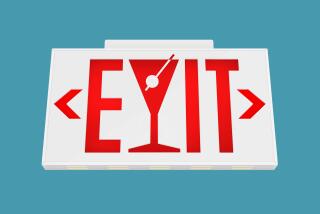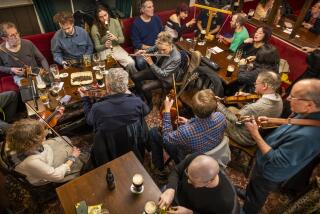In a Twist, Britain Will Give Bingers More Time at the Pub
- Share via
BIRMINGHAM, England — Sarah Dunn probably was drunk -- the cluster of wine glasses and empty bottles on the sticky table in front of her attested to that. But she was absolutely clear about why she and her girlfriend were at the Glee Club in Birmingham’s fashionable Arcadian nightclub district on this Friday night.
“We are here,” the 23-year-old blond shouted over a ‘70s dance tune, “to drink as much as we can, as fast as we can.”
They were well on their way. Dunn and her friend Jessica Damon, also 23, began the night with a bottle of wine at home. Then it was out to the club and, by 10:30, the pair had downed several more glasses of wine, plus a pitcher of five sweet, vodka-based drinks spiced with an extra half-liter of vodka they smuggled in.
“Alcohol is not an enjoyable taste,” Damon said. “It’s like doing drugs. We’re trying to get out of our head, only it takes longer with alcohol.”
Another Friday night, another British binge.
Although Britain still trails wine-producing countries such as France in per capita alcohol consumption, it is the British habit of drinking faster and getting higher that worries health experts, police and just about anyone who has to navigate the pungent and frequently threatening streets of a city center on a weekend night.
Faced with what many describe as an epidemic of alcohol-fueled antisocial behavior, British legislators have responded with a counterintuitive law: They’re allowing pubs and bars to stay open later.
Legislation passed last year and due to take effect in 2005 will allow British drinking establishments to apply to stay open as long as they like, rather than being forced to close at 11 p.m. The aim, the government said, was to create a more “civilized” late-night culture and replace the tradition of drinkers loading up at the 10:30 last call, then reeling into the streets en masse, not yet ready to call it a night.
“You get this mad frenzy of lads who have drunk too quickly and girls in short skirts and, before you know it, all social limits disappear,” said Chief Supt. Peter Goodman of the Birmingham police.
On Friday and Saturday nights in particular, Goodman’s officers contend with as many as 70,000 drinkers pouring out of the 120 or so establishments on Broad Street, Birmingham’s thoroughfare of booze.
The subsequent “antisocial behavior” runs from fistfights to sexual harassment, urinating on walls and throwing up on sidewalks.
“You have people hanging around the streets, all trying to get taxis, and it’s a mess,” said Gary Roberts, a 41-year-old doorman on Broad Street who supported the idea of staggering pubs’ closing times. Public drunkenness, he said, had “definitely gotten worse” in the last five years.
Statistics back him up. According to the government, the British now drink 1.5 times as much as they did 50 years ago. Much of that increase is in the youth market: A 2002 study by the Health Survey of England found that up to a quarter of 13- and 14-year-olds in the United Kingdom claimed to have downed at least five alcoholic drinks in a single session. The government says those younger than 16 are drinking twice as much as their age group did 10 years ago.
A study by Prime Minister Tony Blair’s office released in September said 40% of all violent crime, 78% of assaults and 88% of criminal damage cases were caused by people who were drunk. More than 40% of hospital emergency admissions were alcohol-related, and the government put the annual cost of alcohol-related assaults and disorder at $15 billion.
Blair’s government has promised to unveil a “radical and effective” strategy to combat alcohol abuse this year, but critics are skeptical that it will do much more than tinker with an industry that generates $14 billion a year in taxes and is worth almost $60 billion to the economy.
The move to extend pubs’ drinking hours, many contend, won’t get at the heart of the problem: the amount of alcohol consumed.
“It is hard to say we don’t want drunken young people in our cities at 2 a.m., but we’re going to allow establishments to keep serving alcohol until 2 a.m.,” said Michael Marmot, an epidemiologist and advisor to the Academy of Medical Sciences, which plans to publish its own analysis of the national drinking problem. “Prolonging drinking hours is likely to increase consumption.”
But many police and civic officials said extending closing hours was better than nothing.
“Staggering the closing times won’t change the drinking culture,” Goodman acknowledged. “But it will help us take the top off the bad behavior.”
There already is some anecdotal evidence to support that claim. The British Channel island of Guernsey -- a dependent territory of Britain with its own legislature, judiciary and administration -- liberalized its pub-closing laws a year ago after becoming fed up with the center of St. Peter Port being overrun by drunken youths.
Pub owners said it had made crowd control easier. “I used to be kicking out a full pub at 11, now it’s a half-full pub at 1,” said Glen Pontin, owner of the Bankers Draught.
Experts identify two prime reasons for the bingeing boom. One is “alcopops,” sweet, premixed alcoholic drinks that arrived on the market about a decade ago and have attracted a generation of young drinkers, women in particular. More than half of women between 16 and 24 drink at least six units of alcohol -- defined as half a pint of beer or 3.4 ounces of wine -- on their heaviest drinking day each week, according to Britain’s National Center for Social Research.
The other key factor is pubs and bars offering deals such as two-for-one specials or allowing women to drink free.
“Two of the things that drive binge drinking are price and availability,” said Marmot, the epidemiologist. “In Britain, the real price of alcohol is becoming cheaper relative to income, which is one reason our consumption is going up.”
Some cities have begun to crack down on drink promotions, especially those that encourage people to drink quickly. Blackpool’s pub owners association, for example, prohibits discounting drinks on Fridays and Saturdays after 8 p.m. and has banned all-you-can-drink deals. In Glasgow, the City Council introduced a ban on happy hours.
But it remains unclear whether bingeing can be tamed as long as the culture celebrates the merits of getting sloshed.
In Britain -- almost uniquely in Europe -- it remains socially acceptable to proclaim one’s intention of going out with the sole intention of getting “bladdered.”
London is still the kind of place where a guide will proudly tell a bus full of tourists that he plans to go on a 48-hour bender as soon as he’s off duty.
“Maybe it’s the British way of coming out of our shell,” said Sarah Dunn as she flopped into a chair at the Glee Club with a drink. “We’re very self-conscious. When you’re sober, you worry about what people think of you.
“But when you’re drunk,” she said, “you don’t care at all.”
More to Read
Sign up for Essential California
The most important California stories and recommendations in your inbox every morning.
You may occasionally receive promotional content from the Los Angeles Times.













